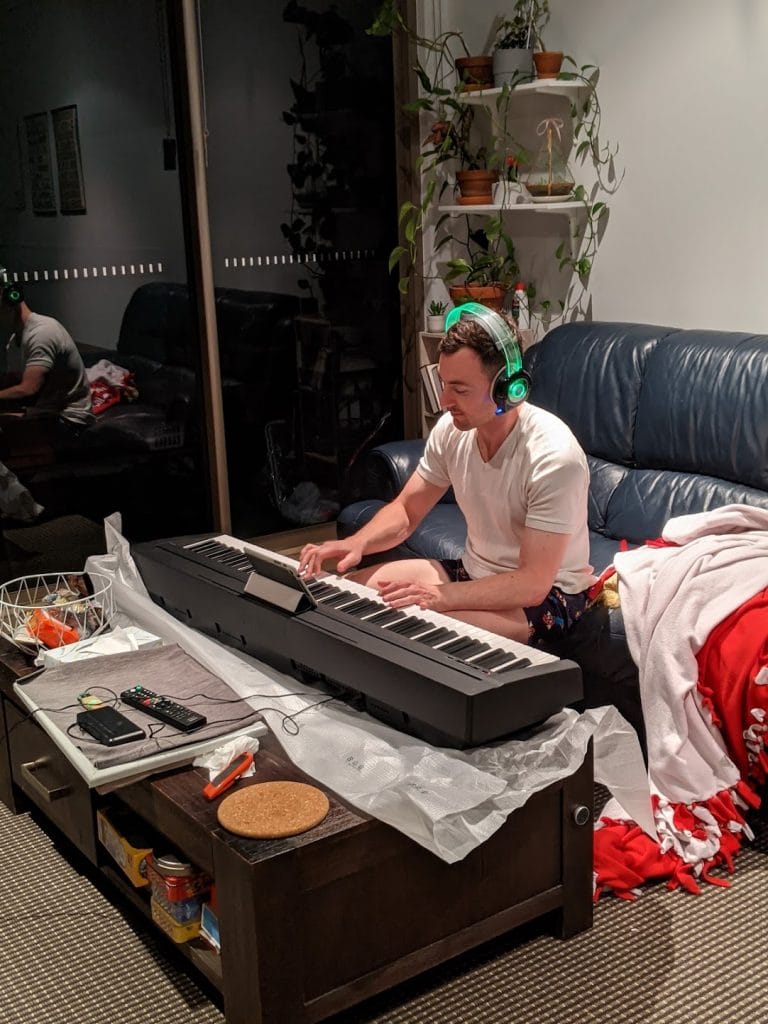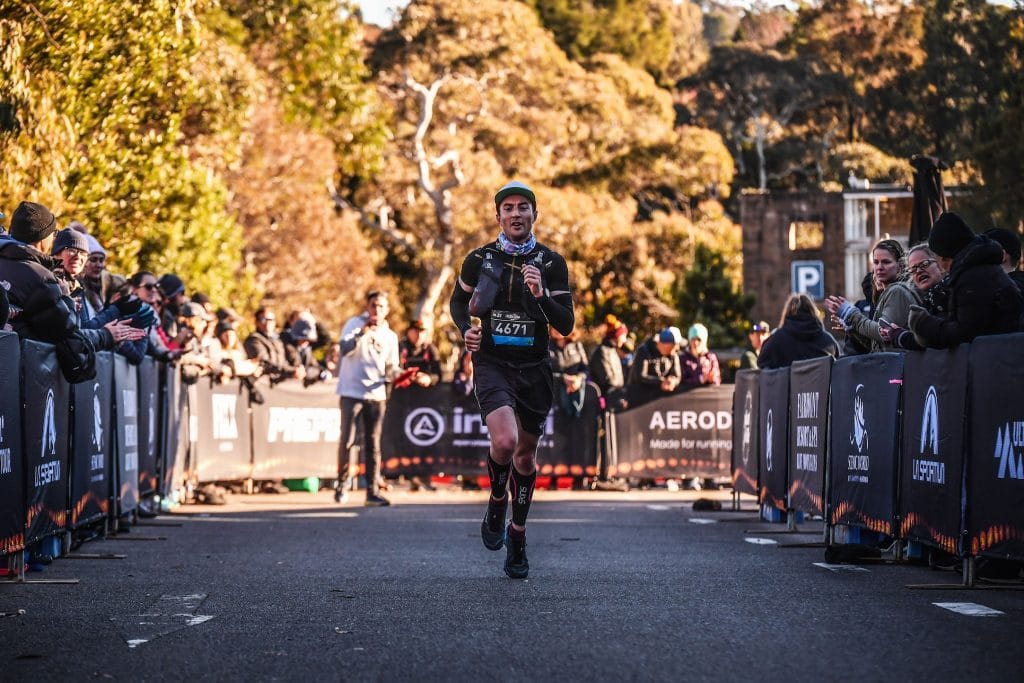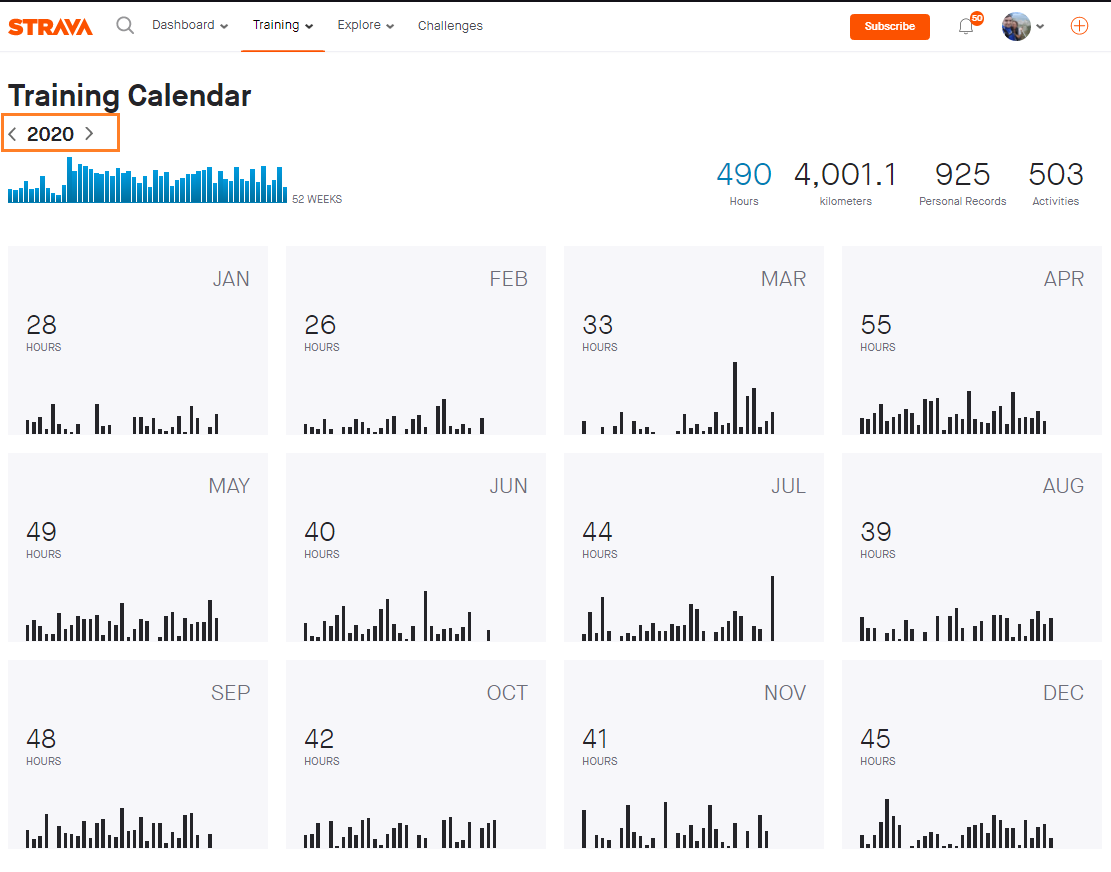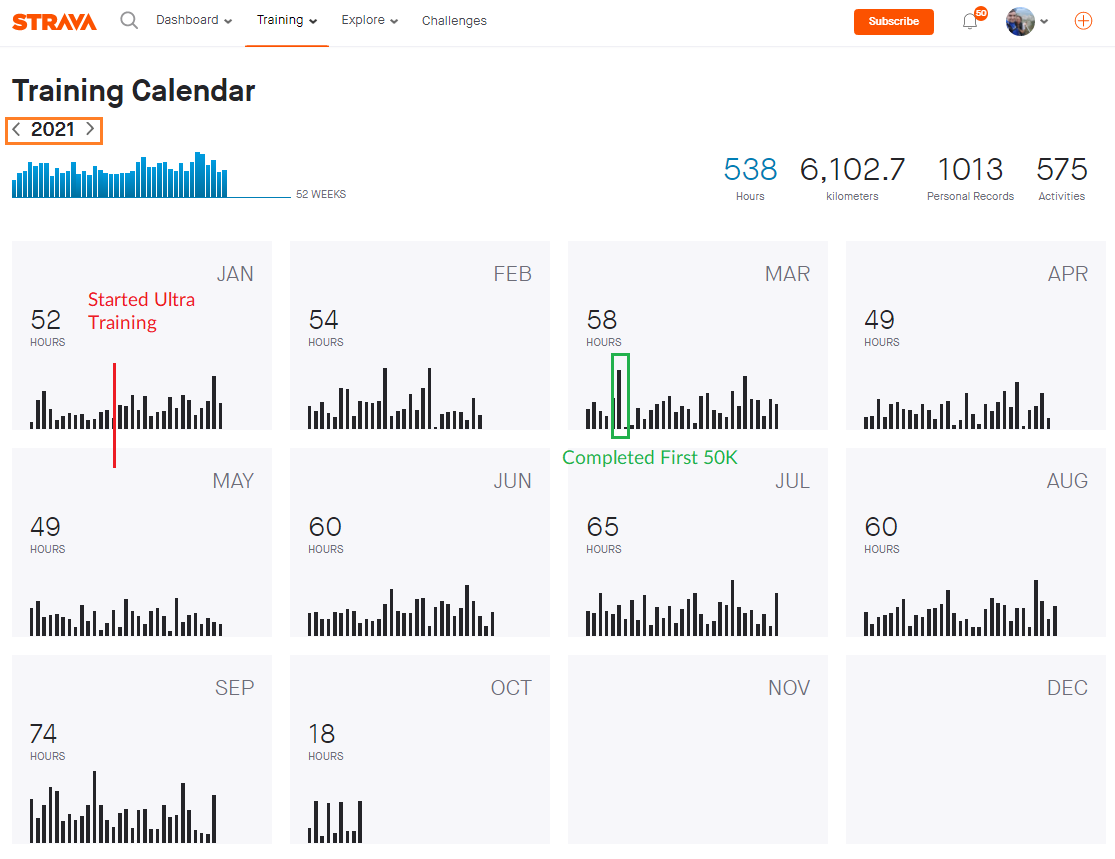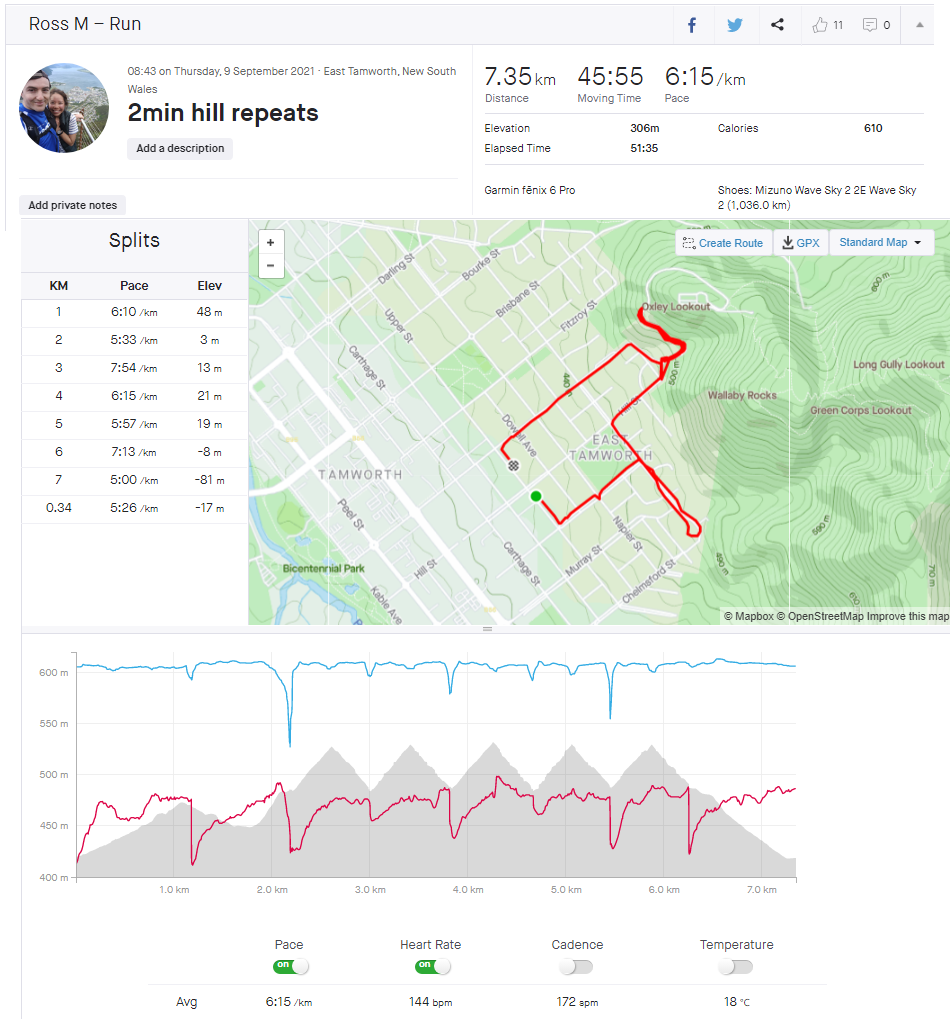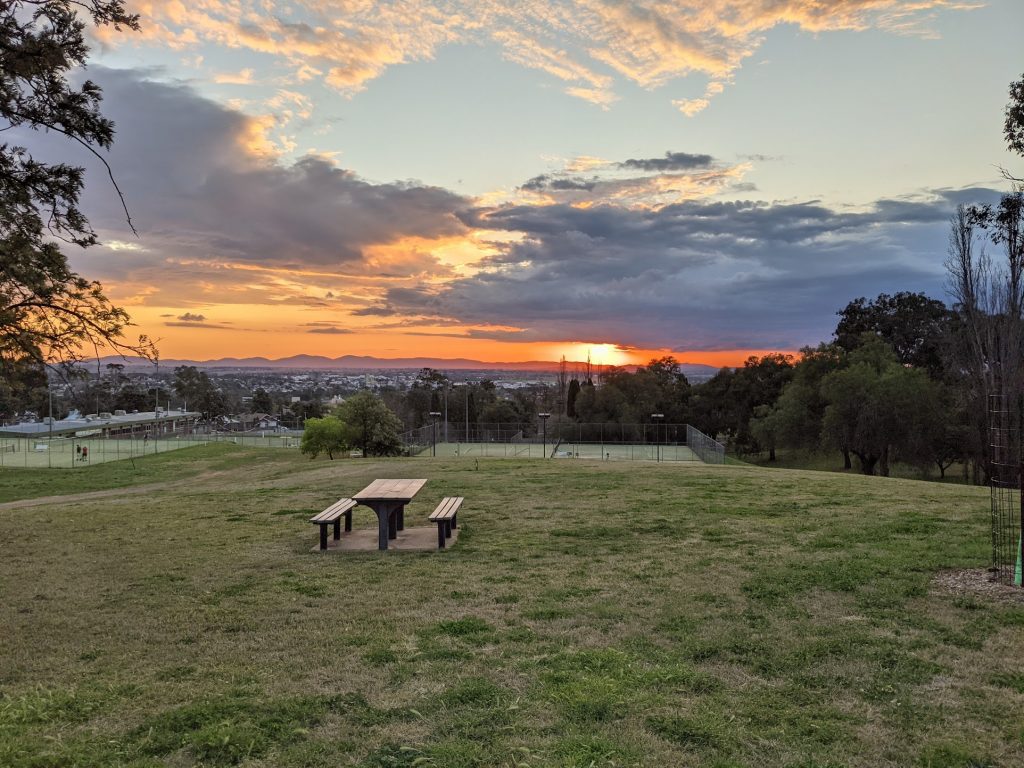Year: 2021
Why did I choose to cycle Japan?
I have always had an interest in Japan from a young age, I assume it’s from watching all the Dragon Ball, Yu-Gi-Oh!, Pokemon, etc when I was young. This is my 3rd visit to Japan and I wanted to improve my Japanese mostly, especially the speaking component as it’s the hardest to practice when you study alone. Although I do believe taking actual Japanese classes is a better way to improve… I also enjoy hiking, so with all the mountains in Japan this was easy pick.
But I chose to cycle as I would be able to meet many people and experience many things that you would usually miss if you were to take public transport or a car. Many people I could talk and interact with. I also would gain a massive sense of accomplishment by completing something so seemingly impossible.
Where did I go?
Journey Statistics
Highlights of the Trip
Other
Future Trips
When I was asked ‘would I do it again?’ as soon as I arrived back home, I was ready to put the bike down for a while and have a rest. It’s been over 3 years at time of writing and I’d definitely be keen to do another bike trip. I had started planning a Taiwan bike trip, which would only be a few weeks and hope to try it in 2022.
I would also like to try something in Europe, maybe in Spain and also cycling from Sydney to my home town Tamworth over a week.
In November 2020 I decided it was time to tackle a goal I always had wanted to try: Learning the Piano. I don’t think there could have been a better time, partially locked down with COVID, plenty of time at home, working from home. These are not the memoirs of an empress, nor of a queen. These are memoirs of another kind. These are the memoirs of a maestro.
Why did I want to play piano? Linking back to what drives me, my goals and then plans:

Looking back on this now, I think the links are quite weak, which is why with sadness I admit that Piano defeated me. I gave up, I quit.
But Why?
I like must be black or white with everything I do. For most of the important things I do in life, I’ll subconsciously have thought why I am doing something. For example; why buy a house? Investment opportunity, stability, making commitments and building a life with my future wife (at the time), etc. Once you throw together the pro / con list, you should be able to make a decision that you resonate with.
When I signed myself up to piano, I thought that I would enjoy it due to my ‘understanding what drives you’. The more I played the more I really started to understand about myself ‘you are more likely to enjoy things you are good at’. I enjoy listening to good classical style music however when I stepped up to the piano, it was just a hot mess of keys and sounded awful. The most frustrating part of all though was even if I practiced every day for a month. If I missed just 2-3 days without training, I would forget it all and be back at square one.
After losing basically all the minimal progress a few times, I’d lost the motivation to continue. I realised that I would never have the motivation to commit thousands of hours into something I was so bad at and not making progress. It was too hard and makes me respect how these pros can play so well, songs 10,000 times harder than what I was struggling with.
So what now?
It’s not like I’m gaining heaps of time back (maximum 30 minutes per day). But some projects myself and Kel have been thinking upon;
- Planning a move to Hong Kong
- Setting up an official training schedule (done)
- More blog posts
- Editing / creating memories and video content
- Getting back into languages
- Getting decent at Japanese again or;
- Chinese (Mandarin)
I got into the more serious side of running in late January (28/01/2021) when I signed up for my first 50K ultramarathon. To say I did any real research or planning would be a huge overstatement. My longest run to that date was around 20K – I knew I had to start running much longer distances to
- Mentally prepare myself to KNOW that I could do 50K in a day
- Physically prepare myself to run my ultra best
My training plan was simple – run more and run long on the weekends. Here’s a simple time series of my training via Strava:
Some time in mid 2021, I set myself a more far reaching goal – to compete and complete the holy grail of Ultra Marathons: Ultra Trail du Mont Blanc (UTMB) (171 km +10,040 m) in Chamonix, France. When I decided this sounded fun and right up my alley, I started to again feel similar to that time in January – inadequately prepared by such an overwhelming test of physicality. I wanted to get good and set myself up for my ultra-best with more of a plan than ‘I’ll just do longer runs’. I set out and decided to hire a running coach as a shortcut to learn what I needed, however that didn’t turn out as planned so here I am, learning and training myself to become an ultra endurance runner. I am no expert and only a few months into ultra endurance training and still learning, but from my learnings I want to cover these areas:
Planning & Learning
- Training Schedule (Weekly / Monthly Google Sheet) – I set up a training sheet which I update weekly or monthly. It will include ideas and locations for hills. It’s also good to tally up your training if you can be that dedicated.
- Race Planning: Find the races that really interest you. Ensure you know how to qualify for them. Train for the race as close as you can. E.g UTMB is 170K with 10K elevation. Break it down – how much do I expect to run, hike, uphill, downhill, etc. Try to base your training around this.
- Coach – consider getting a coach, running form assessment and understand how different training techniques can improve your body and mind.
- Podcasts – Good to listen to while running for all running topics. My favourite: Science of Ultra and also Mile27
- Friends
Physical Training
Types: variety is the spice of life. If you do anything too much it’s surely not good for you. Mixing up your runs (from what I understand) will improve overall versatility and ensure your muscles are prepared.
- Long Runs: Up to 40% of overall weekly time. Less than 5 hours unless you are training mentally or gut testing. Probably want to do a big one (8+ hours) around 6-8 weeks out in case you get injured. This is a good mental boost and test gear, gut and mind.
- Speed (Intervals, progressive, Fartleks, etc): Usually 1-1.5 hour sessions. Want to be doing minimum 30 minutes of actual speed running when you go out. Remember to be specific, Usually don’t want to be doing 100m sprints when you are training for a 170K race. Longer efforts will be more effective:
- e.g 3min * 10 efforts or 8min * 4 efforts. Etc. My pace for this training will be 5-10km
- pace (3:00 fastest)
- Fartleks can be fun when combining with Strava segments. You don’t need to do consistent times / repeats. Effort is the main factor. E.g Segment 1 ~6mins, Segment 2 ~12mins, Segment 3 ~5mins, Segment 4 ~5mins.
- Hills / Hiking: UTMB will have a lot of climbing (roughly 5.9% overall course (10K/170K)). Although not always possible, best to try to replicate near this in your weekly schedule. I.e 100K per week = 5.9K elevation. Similar to intervals, I want to get in ~20minutes of actual climb time as well as descent time. I.e 6 * 4mins, 3 * 7mins
- Comfortable Runs: These are the usual runs. Comfortable (talking) pace. These are to put some more mileage in the legs when fatigued or to impede further fatigue. These will usually be in between the harder (speed, hills, long) sessions.
- Strength & Mobility:
- Personally, stretching after running works for me. I have a sauna so it’s my place. I’ve never been flexible and something I want to properly try. After (almost) every run.
- Strength has become more important as I’ve done more running although I still need to put more emphasis on it. Hip flexors (slide 5 & 6). Also don’t want to have runners arms, so it can be good to fit in some upper body through F45 or the like. Core is also very important so put in some situps with focus on obliques. One F45 per week, each walk (usually every 1-2 days) do a few situps.
- Rest: something I’m not very good at but a quote I like to paraphrase – when you are training you are hurting / tiring out your muscles. When you are resting they are recovering and becoming stronger. Like a senzu bean.
Nutrition & Gut Training
- Consider hiring a nutritionist or at least researching…
- Training and prep
- For runners, carbs are good. Low GI is best. Eat more wholemeal
- Eat 1-2hours prior to a run, test and see if you can bring this down
- Eat less sugar
- Get to an efficient weight
- Eat more fiber
- Try glycogen depleted runs
- The Long runs
- You shouldn’t need food top ups for less than 2 hours
- Take food for anything longer than 2.5hours
- Good idea to nibble every hour instead of large amounts
- Test food and gels, gels also expensive, you can make your own and test your own foods
Other
- Mental – you won’t know if you don’t attempt something tough. Chafe is still the most scary thing for me… something I need to further test. If you can test something before the big day it’s best to try it and give yourself that confidence boost
Final Words
Everyone is capable of training themselves with the right commitment and learning. Like a diet, find something that works for you, if you can’t stick to your training plan, look at changing it up to make it fun – strava segment seeking and weekly planning can actually be fun. I have shared some of the things I have started reading, learning and planning to improve my running to achieve my goals. I’ll test and improve this as I go through the stages to see what works and does not work for me.
If you’re to take one thing from this, think to make yourself Training Schedule (Weekly / Monthly Google Sheet)
Running Form Assessment
One of the things I was most excited about when I signed up for a running coach was getting my form assessed. I’d never really seen myself run before even though I do it all the time so it was good to set aside some time and record and analyse my form.
In truth, I not-so-humbly admit I thought my form was pretty good, so I was a little surprised when I had received quite a few pointers.
I made a quick summary of my form assessment and where and how I could improve:
My Running Form Assessment
I made this set of slides myself. I filmed it, sent it to coach. He drew the wireframes then analysed it. We then we went through it together where I took notes so that I could quickly put something actionable together.
Final Thoughts
My takeaways from this whole process was that
- There is no perfect way to run
- If you are comfortable and free of pain you will go far
- You can (easily) make (slight) corrections to make yourself a more efficient runner by conserving energy if you plan on going far (probably +21K)
- You can probably do your own running for assessment with the help of Google & Youtube (see final slide)
Other Reading
- So I Decided to get a Running Coach
- Running – The Start of Purposeful Self Coaching
Why I decided to get a Running Coach
I’ve always been stubborn, thinking I can do and figure out anything by myself with my trusty friend Google as my guide. I’ve never really had any issues to date with reaching goals and seeing parts of improvement, however only the other week, I realised that I was destined for greater distances which scared me. Instead of fumbling around in Google with slow progress, I wanted to fast-track my understanding and preparation to reach my newly established goal: to compete in true Ultra Marathons further than 100K.
- To compete and complete the holy grail of Ultra Marathons: Ultra Trail du Mont Blanc (UTMB) (171 km +10,040 m) in Chamonix, France
- Run (one of) the most prestigious Ultra Marathons in my home away from home; Japan. Running the circumference of Mount Fuji 160+km and ~9,500m elevation.
- Compete in the heart of Australia in what looks like a different universe: The Western Mac’s 128 km Ellery Monster on the Larapinta Trail
My longest run until writing has only been 50kms which took a bit under 5 hours. Looking at these races where the fastest elites run it in ~20 hours, saying I was concerned (but maybe to a more extent, excited) was understatement. Like when I first looked up protein powder, I was hit with an overload of information that I didn’t want to digest. I went googling for running coaches with the main aim to be information gathering rather than a typical 12 week training program. I found a few podcasts by Mile27 and listening to their podcasts on a long drive, I knew these guys had the breadth of knowledge I wanted. How to best prepare yourself to run long and run hard.
Review of Running Coaching
At time of writing I’m on my 4th week with my coach and I will not continue forward. I have gained a lot of drive and passion for running and specifically understanding how different training plans impact performance.
As I mentioned, I went to a coach with the intention of learning and not to do simple weekly programs. I believe my expectations are actually that of hiring a running coach to become a running coach – not a runner. So probably my bad, but this has given me the drive to listen to most of the Science of Ultra podcasts (maybe 50 hours) and with what I have learned through doing these weekly session of which I’ve never really done before (intervals, hill effort repeats, recovery days, progression runs, etc) as opposed to just going out for a jog.
Another big piece of motivation I’ll take away from this is that running is hard, ultra marathons even moreso. If I’m able to learn all of this and self coach myself to successful ultra(s) then I’ll be even more proud of myself.
Final Thoughts
Running coaches can be a great tool especially for people wanting to get some variety in their game. You may be in for a rude shock if you want to be like me and learn so you can coach yourself, they are not too keen to share their coaching secrets! Many of the top endurance runners don’t have coaches (although they have had them historically and probably learnt what they needed from them to coach themselves @killianJornet).
Running is hard. You are ultimately the best coach. Listen to advice and the body and learn from others to improve. If you lack discipline, coaches are probably amazing for you. If you are self motivated to get out running and also to learn, then maybe you’re better off alone.
Continue Reading
- My Running Form Assessment
- Running – The Start of Purposeful Self Coaching
Home is not static but a transient thing that can change depending on your current place. Although for some people, there might only be a single home, some people have multiple and it’s not a single thing. For me, I have 2 homes;
- Where I live now with my perfect wife and;
- Home, home aka My parent’s house where I spent the first 19 years of my life in Tamworth, NSW
Sometimes I look back through my photos and videos and notice that where I spent 99% of my time at home 1 or 2, I have the least amount of footage. The large amount of my collection comes from travel and trips away from my regular living place. I think this is such a shame because as soon as your home starts to shift and you move away from it you’re missing a lot of these nostalgic places because at the time you were living there the thinking is like “oh well, I live here so I can see and do that whenever I want”. But then you might never end up making the memories or any footage.
With this revelation I spent some time in my home 2 ensuring I can capture some footage so I can easily remember these important places in my life.
Compiling My Home Movies
Tamworth Bike Ride 2021
Tamworth Trail Running - Flagstaff Mountain
Tamworth - My Favourite Childhood Tree
Tamworth - Old Rugby Videos
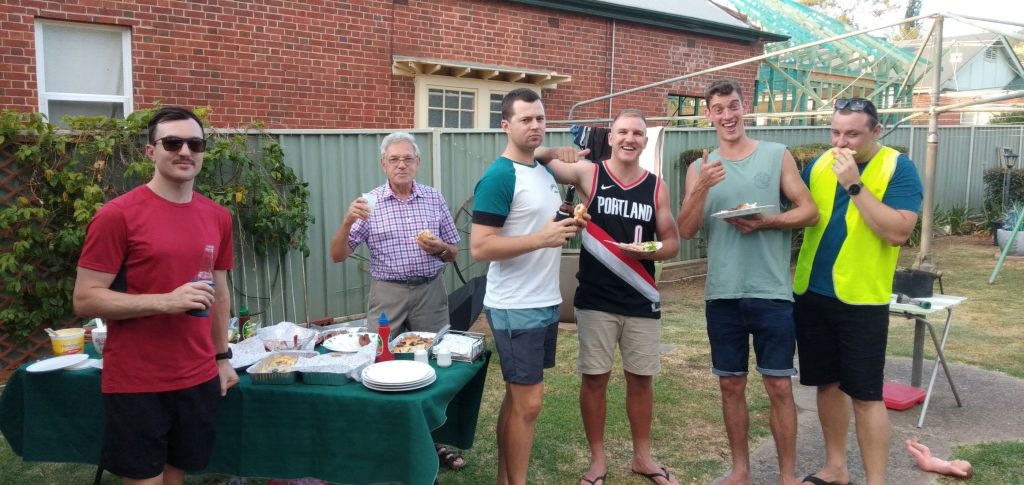
Coming soon…. Home 2
“If you fail to plan, you plan to fail.” – Benjamin Franklin.
I originally titled this ‘The Importance of Plans and Goals’, then realised that without a goal, there’s no need to plan.
But then what is a goal and why do we need them? To me a goal is about understanding. Understanding ourselves, our wants, society, family, etc. To set a goal we first want to understand WHY we want to achieve the goal. Most of the time this will be subconsciously known to us but it’s always best to know The Why and the Goal.
We need goals to give life direction, meaning and progress. Too often when asking people ‘What did you do on the weekend?’ you will get the lacklustre reply ‘ah, not much’ or ‘just chill’. Firstly, if that was my goal – to chill and do nothing, then 100% fine. But if you sit on your couch watching the Olympics or an amazing documentary thinking ‘How amazing, I wish I could do that’, then you need to ask yourself the hard questions:
- What is your purpose?
- What makes you happy?
- What gets you out of bed each day?
Although not a necessity, I would recommend first, understanding yourself (The Why), then building your Goals and then The Plan to achieve those goals.
Looks like a lot if going on… Start from the left.
- What gets you out of bed, then;
- Link these to goals, and then;
- Set a plan to achieve these goals
I find the more connections you can make between your joys and what gets you out of bed, the more strongly a goal will resonate with you.
Example: Goal: Ultra-Trail du Mont_Blanc
- The Why (what I get out of bed for):
- Love for mountains, nature and scenery
- Love for Travel – chance at a French-Swiss Adventure
- Running (can) give me a euphoric ‘high’ during and a sense of accomplishment after
- To challenge myself – A few years ago, if you told me that someone ran 170kms with ~10K elevation change, I would say it’s impossible. Those people are heroes. I want to be a hero. Maybe part god complex part egotism part conceited but I like to challenge myself to do things most people wouldn’t dare or chance upon themselves to accomplish. A paradox which could be written on my tombstone – Ross ‘The Humblest’ Michell.
- Goal: I want to run the Ultra-Trail du Mont-Blanc (a 170km mountain race in the Swiss-French alps with one of the largest fields).
- The Plan: like all of my big goals, planning starts with a Google Sheet.
- Research the course (Length: 170K, Elevation: 10K, Cut off: 46h 30m). How on earth will I do this?
- Research: running, types, podcasts, coaches, travel and course map.
- Set up a training plan
- Find and hire a coach
- Timing – Yearly in August
- How to Qualify: 10 ITRA points in a maximum of 2 races. Which races will I do…. This basically turned into it’s own adventure
- Convince the wife to allow and support me
- Research the course (Length: 170K, Elevation: 10K, Cut off: 46h 30m). How on earth will I do this?
Most importantly, writing these things down can help you as your go. It sure helps me when I write these articles.
Happy Planning!

Unless you understand this formula, time is fixed, it’s something you can’t get back.
As a kid we grow up with these expectations which almost don’t allow for questioning: go to school, get a job, find a partner, buy a house with a white picket fence, have a baby, become a grandparent, done. It seems like a question everyone has answered without even asking themselves of something so vitally important.
These 5 questions are the ones I believe are most crucial in thinking about how you want to spend your time without mindlessly following the masses.
- Do I really want to be a parent?
- Relationship
- Do I need to buy a house?
- Career / Money
- Why am I alive? If I retired today, what would I do?
I don’t always take the most orthodox approach to life and that’s purely due to asking myself questions and tossing up the opportunity cost (considering all options) in terms of time and selecting the best option.
1. Do I really want to be a parent?
Yes or No? I believe this is the most important question that people really need to ask themselves. If you get this terribly wrong not only can you severely alter your own quality of life, but also the next generation’s life.
Just like anything involving decisions and opportunity costs, I would recommend making your own table of pros and cons. I generally start with the cons.
Cons
- Time commitment
- Short temper / lack of patience
- Cost to the environment
- Cost to my wallet
Pros
- Live vicariously through your kids
- Can bring a lot of joy
- Naturally paternal / maternal
- Give you something to do
For some it will be clear after putting a simple list together. For others, more research may be needed. Luckily for me, I have 2 brothers with 3 kids each. A simple visit to each house gave me solid insight into the life of being a parent.
Personally, the time commitment was the killer for me. I like my life, I like spending time on me, I do what I want (which is what the wife also wants). If a kid came into my life, almost all of my time for the foreseeable 18 years would go into that kid away from me. Yes, I’m selfish but that’s how I want to live MY life, your life is your choice. Communication is also key, talk through these things with your partner before you get married or get too deep.
Remember your life is crafted by your own choices, be inquisitive and know how you want to spend your time to live the life you want to live.
2. Is this the right relationship for me?
- What kind of relationship am I looking for?
- Why am I with this person?
- Do I want to get married?
Firstly be honest with yourself and then communicate and be clear with your partner. Know what kind of relationship you want: is it just fun? Serious? Nothing? It’s up to you. Pick one and be clear, there is nothing worse than being in the ‘grey zone’ – keep it black or white.
If you are lying to yourself and your partner, you are wasting 2 people’s time and effort.
3. Do I need to buy a house?
In Australia it seems like another rhetorical question… But why do we want to be house owners? Just to be clear, I’m not against buying a house, I just think it’s most important to consider your situation and timing in relation to buying. I’ve listed some pros and cons below.
Buying
The Cons of Buying: It’s a big commitment of money, but responsibility as well. It may also lock down your options for working hours, holidays and other commitments whilst putting further stress on the purchaser.
The Pros of Buying: You are an owner – you can do almost whatever you want with the place, you have a secure place to live so no one can really kick you out. The price of the house (most likely) will rise in value – so you can make money on the purchase.
Renting
Pros of Renting: Cheaper initial cost and little upfront investment (bond), freedom to move places if you don’t like the location or house. If you go on an extended holiday, you will pay no rent (i.e you can literally move anywhere in the world).
Cons of Renting: Can be forced to move out of home. Rent increases are inevitable. You will be ‘paying for someone’s mortgage’ (although I don’t believe this to be any different to being employed).
My wife and I purchased an apartment in Sydney in 2019. We both actually love the apartment & amenities as well as the location (closeness to shopping, national parks, safety, etc). We have seen so many benefits in terms of tax, rental income and getting experimental on the tools. Doubts about the purchase have only recently come to mind as we plan out the next few years in a post-covid world where we would like to work and live internationally and having a large asset back in Sydney is a bit of an obligation.
4. How much money is enough?
This is almost the same as when can I retire? Do I need to keep working until I’m at retirement age? I want to challenge the thinking here – especially to those who are not planning on kids. An idea which I autonomously thought of but which is well documented by Bill Perkins is below:
What’s your optimum retirement strategy? Are you going to just keep working long hours in order to sock away more and more money that you’ll never get around to spending because you’re working?
The Die With Zero philosophy is once you’ve saved enough to fund your retirement and give to your family and charities, you should start focusing more on generating memorable life experiences. That’s the time to live life to its fullest, not to be pulling even longer hours in the office, or waiting until you’re too old to be able to enjoy doing things.
https://summaries.com/blog/die-with-zero
In the end, how much help do you need to give to your kids? If you’ve raised them to be self-sufficient, I’m sure they will be okay on their own or with just a little support. You’ve worked hard to earn this money, go enjoy your money and don’t end up with a James and Lily Potter amount of money left over without being able to spend and enjoy it.
5. What is MY life?
Imagine a life without having to worry about time or money or anything else. What would you do? What do you enjoy? Where do you WANT to spend your time?
This is how I like to think about ‘the meaning of life’ – my meaning is to enjoy life with the people I care about. Is there another life? No idea, but what I do know is I will live now and die one day and I will enjoy the hell out of it.
Have a good solid think and figure out the things you love to do which bring joy to your life. For me this is:
- Life planning
- Short Term: Planning my next few days, next holiday, mapping a new trail run / bike ride, blog writing etc
- Long Term: Exploring google maps for holidays, Expense / qantas point planning, investigating long holidays, blog planning, etc
- Travel
- Running / Hiking / Nature
- Anime, gaming and computers
- Collecting (cards) and creative hobbies
If I were to retire tomorrow I would honestly be up until at least 3am ‘life planning’, I call it. Which would just be on my custom build PC throwing ideas on a spreadsheet in timeline format and tossing up ideas of which one sounds best and works best with my current situation and timings. No doubt those plans would include each of these dot points. The next morning I would run the wife through these plans and see if she’d be keen on them – that is my/our life and I love it.
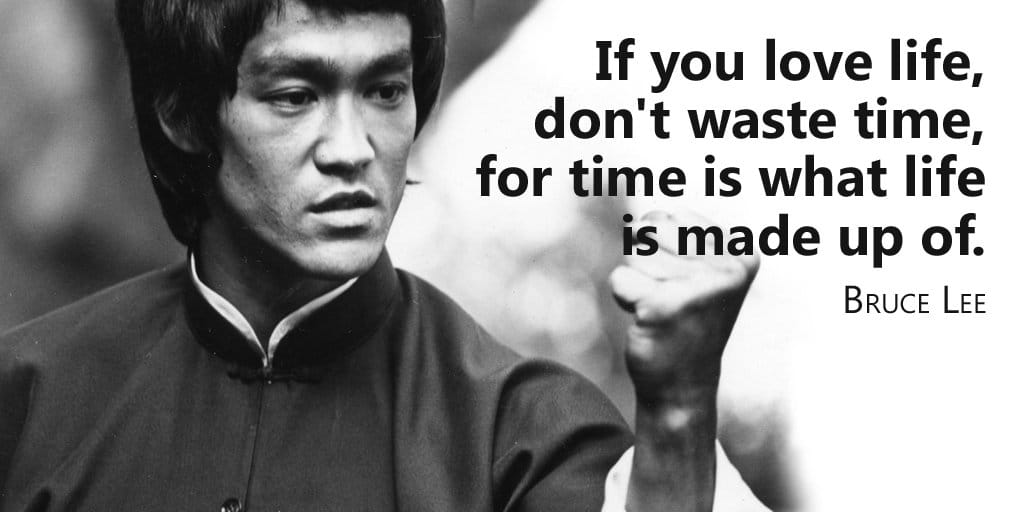
Why did I want to run 50K?
Why not? To be honest, being impressive is a big motivator for me. A lot of people have goals to run 5K or 10K, so why not just push for something ridiculous? Similar to what Goggins says ‘be uncommon amongst the uncommon’ is something that really resonates with me. Most people have goals – I prefer to have challenges, it makes them all the more rewarding when you achieve them. Other examples:

Why was this my time to run an Ultra Marathon?
Firstly, the plain definition of an Ultra is a long-distance running race that is longer than a marathon (42.2K). My definition is more like Trail Running for any distance 42.2K or longer. Some people think you need years or months of training to run this length. There are plenty of stories out there saying otherwise and I tend to stick with the belief that almost any semi-fit person can complete an ultra – the manner or time in which you complete it is to your own standard. It may take someone with next to no training 10 hours to walk the whole thing, but they will have still completed one!
With this belief, one late night I finally made the plunge onto the internet to find some challenges. I found this one: Warburton Trail Festival – Lumberjack 50K.
As I read through it, I thought I had seen it before. It took a while, but I remembered the Beau ‘Bean’ Miles ran this same one in his video: The Human Bean: 40 days on a tin-bean diet.
As a giant fan of Beau, I knew this was the one. With next to zero training, I signed up there and then, locked and loaded for my first Ultra. Upon signing up, I just wanted to complete one in a decent time without walking – i.e not first, or at 5min/km pace. The goal / challenge of 50K was enough – or so I thought.
My Preparation and Training
Checking through my emails, I signed up at:
Date: 28/01/2021
Time: 11:17 PM
The race was on Saturday, 6 March 2021, so that gave me a massive 36 days to train up. After looking at my Strava history, it was clear that I had not put in the training yet to get anywhere near 50K. I knew that I would have to really start upping the KMs to even have the confidence to get down to Melbourne and to the starting line.
Extract of longer runs from sign up date:

It was clear that over the next few weeks I would have to put in a lot of time into running. I would usually write up a plan for these things, but I just knew I needed to put in the time. In hindsight I would suggest POST TBC: How to prepare for an Ultra Marathon. I had a look at the elevation profile and type of running that would be expected and tried my best to mimic my training around that.
Weight
Pretty simply, it’s easier to run long distances when you carry less weight. At registration I was around 78kg. I thought anything under 74kg would be good and that would naturally come through more running. I ended up coming down to 72kg.
Diet
Food provides you with energy. I needed energy so I was eating a lotttt. Breakfast usually consisted of muesli with some fruits (banana, mixed berries). I cannot stress how important bananas are for me. Lunch and dinner was usually 1 part vegetables, 1 part protein (meat or vegetable protein) and 1 part carb (flat bread). So 67% of my meals were a burrito mix 🌯.
Listen to your body
This is the most important. Listen and learn. I found that bananas really gave me energy. I made my own energy gels using bananas, BCAA capsules, caffeine pills, frozen berries, cinnamon, muesli, etc. I stored it in a chilli bottle.
I went out the first day and ran 21K on trails. Knowing that’s not enough, I thought running on tired legs would help build strength. I think I pushed too hard as my knee started to feel pain towards the end of the 21K footpath run. In hindsight I should have stopped but being around 18K in, I couldn’t do it to my pride. It wasn’t anything serious, but to recover I had to keep it to the elliptical machine.
Training types and environment
I’m a firm believer in training in the environment you will compete in. Luckily for me, Lane Cove National Park is basically my backyard, so it was easy to run trails. I would recommend mixing it up to incorporate hills, long distance and short speed (maybe not sprints though).
Study the map
Load gps on watch.
Pre race
Probably better for another article – Working Holidays – making the most of COVID changes in workstyle.
- Collect your bib! Day before if possible
- Charge your GPS watch
- Prepare your gear the night before
- Prep your breakfast
- Eat big eat early
- Arrive with time
Race Day
The hardest part of the day was waking Kel up early to drive me there and back! We arrived early and I couldn’t believe my eyes, Beau ‘The Bean’ Miles was there, as the Lumberjack again! I walked straight over and introduced myself and wished him good luck with the race.
As with anything that means a lot to me, I felt nervous at the starting line getting the racing brief. Unlike most races, the starting bell for this one is not a horn, but when the Lumberjack cuts through the log (see video).
The run started well and I was probably towards the middle/front of the pack which was unexpected as the athletes looked very fit. Started at roughly 5:00mins per Kilometre until we hit the wall of elevation – roughly 700m of 20-30% incline. I had often thought of myself as a downhill specialist, however I was powering past my initial group and took off once we got to the top.
It was cold which helped keep the heart rate down as I raced onwards through the more technical and wetter terrain. I had skipped past the first few aid stations as I wasn’t drinking as much water in the cold as I would during my Sydney training. I eventually caught up to a few others on the trail and actually made somewhat of a trail mate as we paced well together. At the 30K mark I had to let my running buddy go as I started to feel ill, a first. I quickly realised I hadn’t had anything at all to eat, so squeezed down my whole chilli bottle of Banana energy. After 10-ish minutes I was ready to roll and hammered down hill, barnstorming the next 15kms.
With only 5-10K’s to go, I realised I had this in the bag! From roughly 45kms, the course was mostly gravel. I kept looking back to ensure no one was trying to pip me towards the end. I had originally told Kel I would be roughly arriving after 5:00hrs assuming I was running a solid time. I had to text her mid water crossing to let her know I was ahead of schedule. As I was streaming down one side of the river I saw her running towards the finish line. Crossing the line I thought I would feel something – all I felt was exhaustion. Asking the officials for my place, they had surprised me to the extreme. I had come in 10th out of 152 athletes – for my first Ultra Marathon. There it was – that sense of accomplishment and jubilation that I had way overachieved on my expectations.
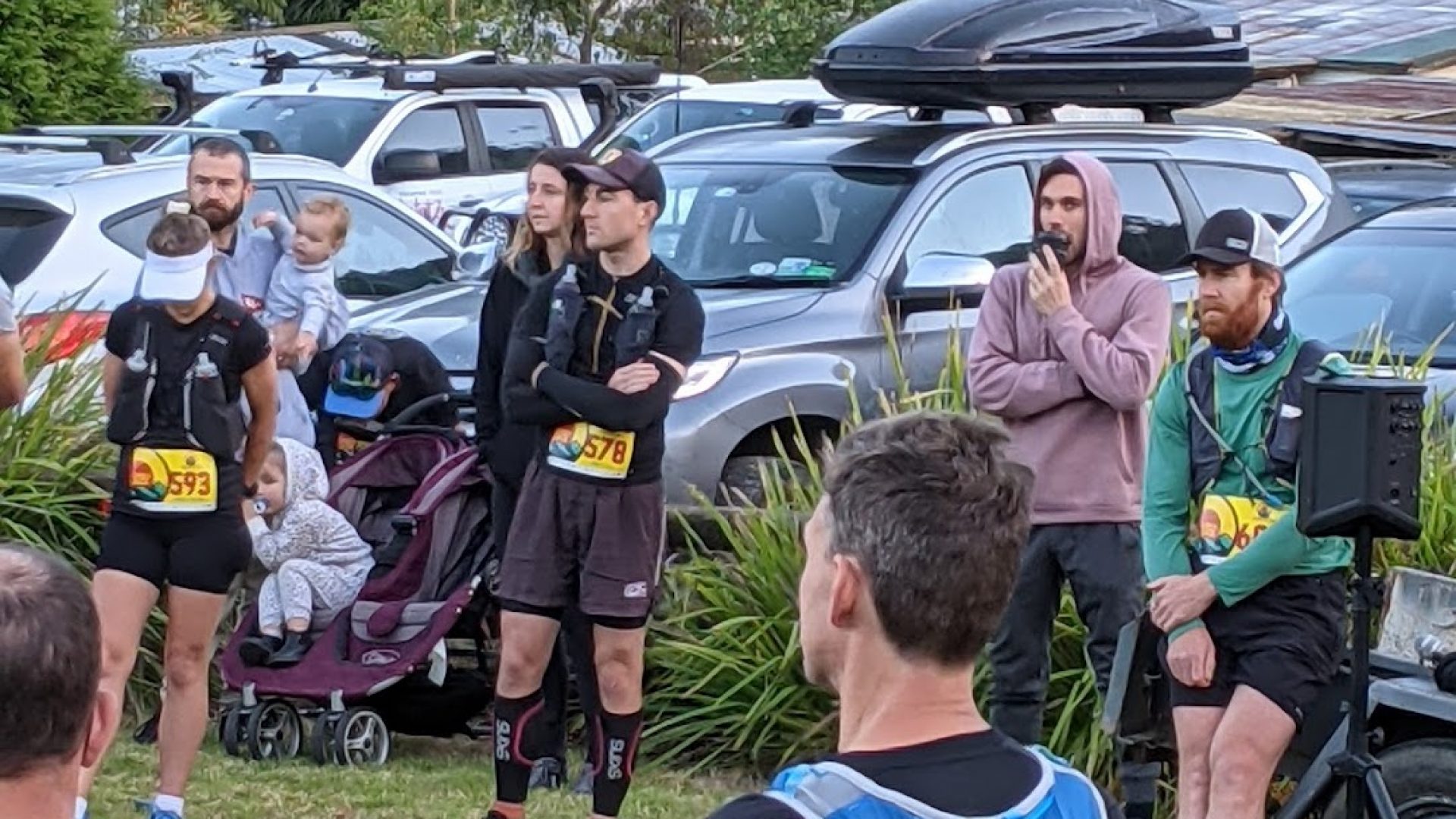
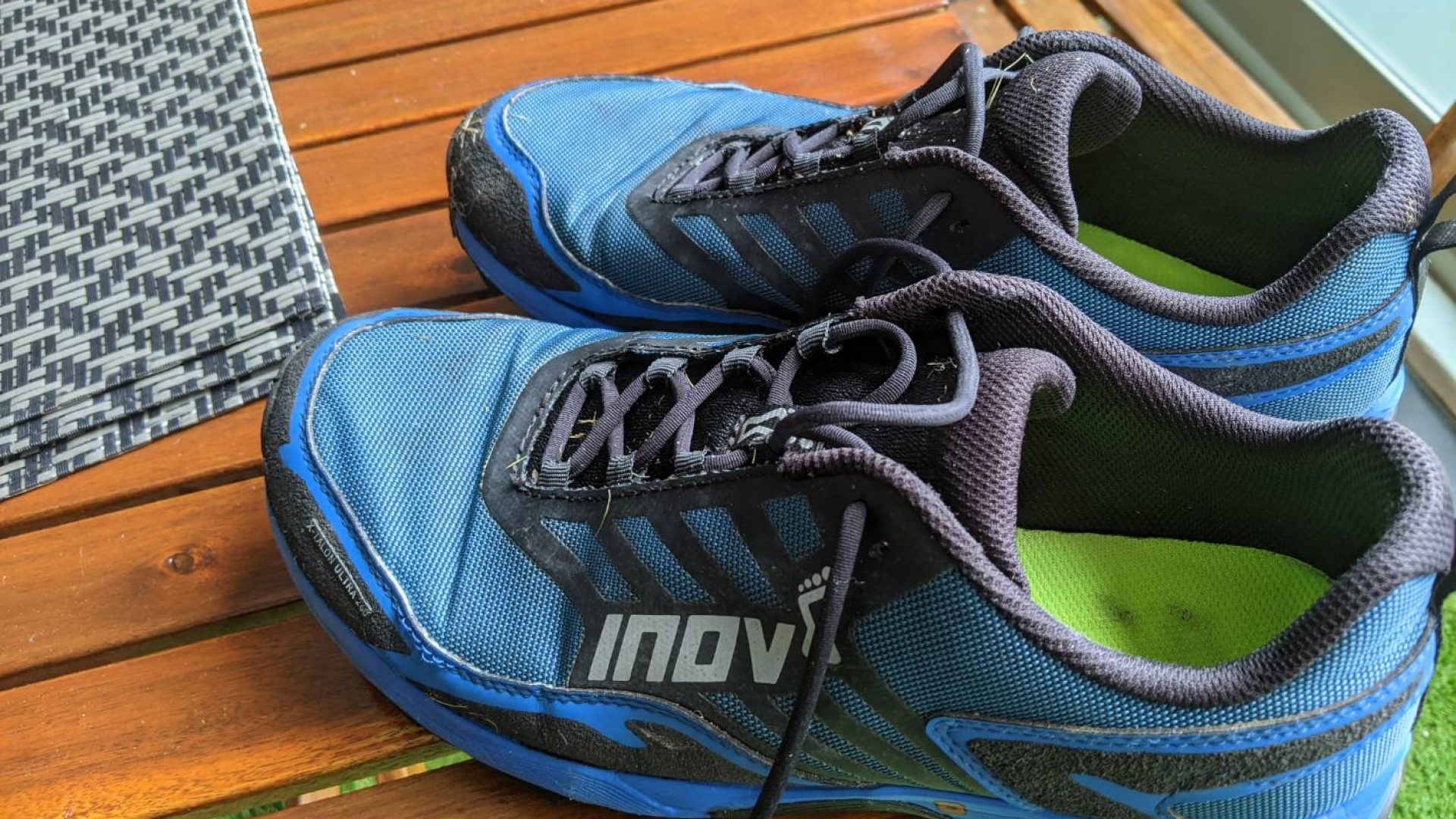
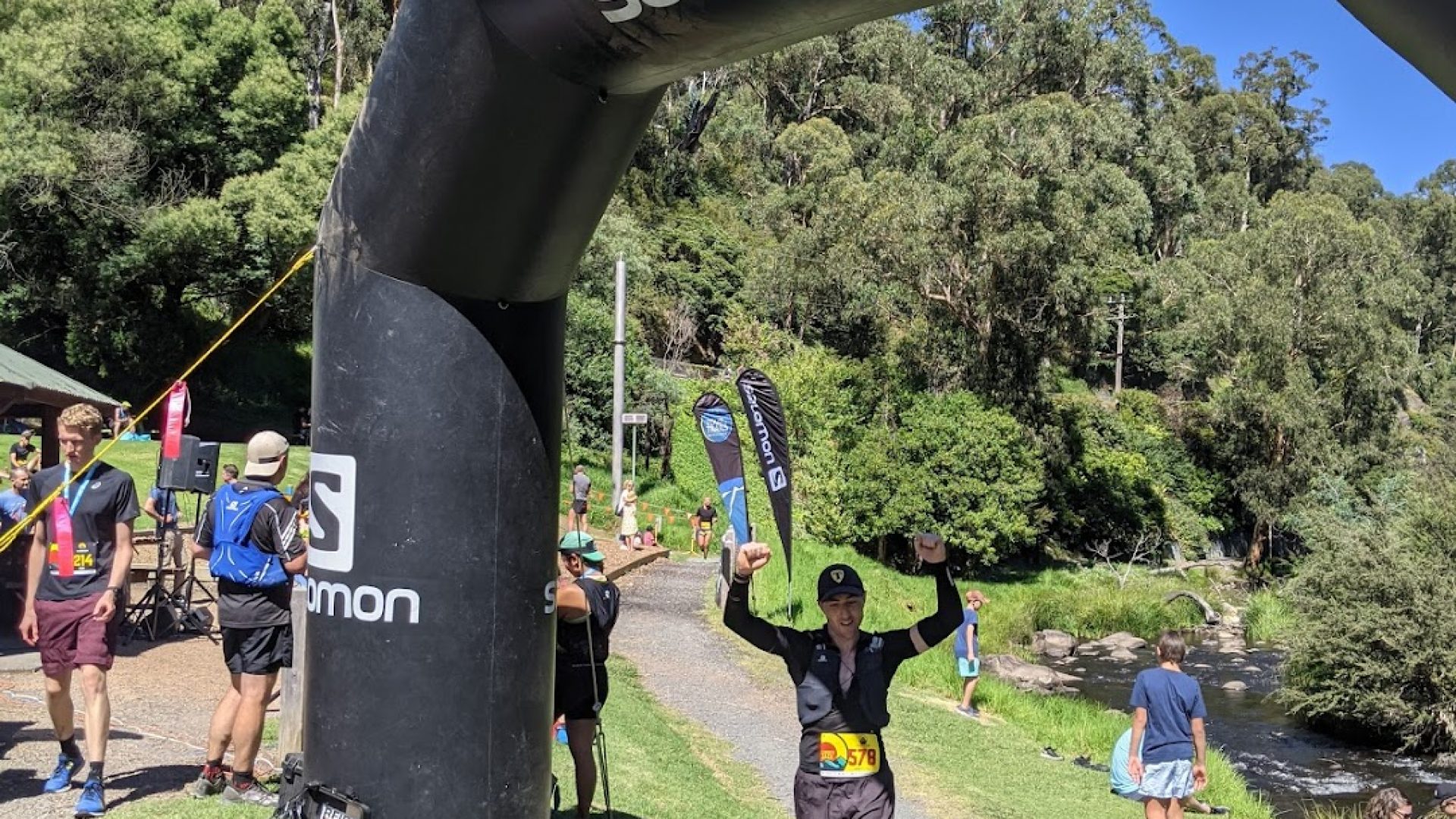


Post Race
Celebrated with an ice bath in the Yarra River. The freezing water I think helped with recovery and muscle soreness as I wasn’t completely gassed the next few days.



